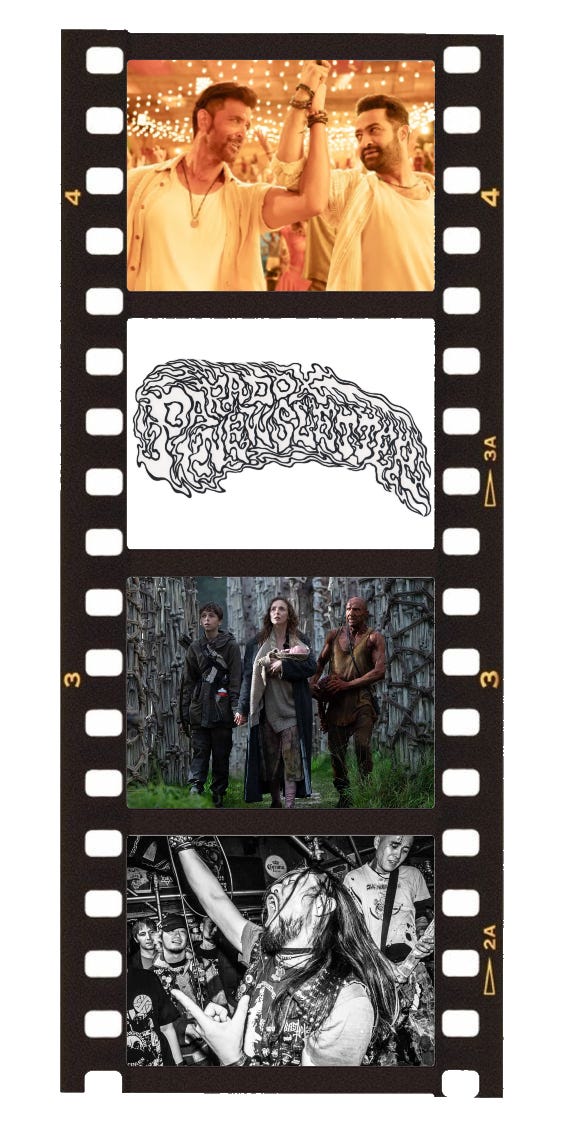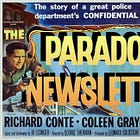Issue #395: Praising Box Office Flops, Hating on Critical Darlings
The Music League is underway for Paradox Newsletter. If you made it in, you are part of an awesome group. Here’s the playlist from the first week, with the prompt of covers. Specifically, the criteria was to submit a song that had previously been recorded by another artist.
I don’t want to give away how I voted or influence voting — we still have five people who haven’t submitted votes. Get to it, they’re due Wednesday. But overall, I am super impressed with what people came up with. As a playlist, I thought it just worked. I added a few albums to my library for deeper consideration.
Some of these covers are so iconic, I think they’re better known than the original. That’s especially true for the INOJ version of “Love You Down,” I think I’ve heard it like 100x as often as the Ready For The World original. I don’t know if I’ve ever heard the original version of “Looking at You,” but The Damned cover is a hell of a start for a playlist like this. “Ai No Corrida” was totally new to me as a song, but the version someone submitted was fantastic. “Crow Jane,” “Spicks and Specks,” and “The Whole Of The Moon” stood out to me as particularly unique and weird. I had barely listened to Sarah Vaughan before her inclusion here, but I am a huge fan now. Her version of “Alone Again Naturally” will probably impact my listening habits the most.
But the most discussed song has to be “Band on the Run” by The Langley Schools Music Project. I guess this is something people know about, but I had never heard of this or the project’s organizer, Hans Fenger. And “Band on the Run” is an incredible choice, one of the few songs they covered that I would recognize. I am curious what it would take to get the Langley Schools version of “Sweet Caroline” played at Fenway.
Next week, the prompt will be songs under two minutes. Lotta directions I can go. But this group has shown elite ball knowledge, so I trust we’re getting all heat til the end of the league. And spectators should be watching closely.
2025 Cinema Mid-Year Recap
When I don’t have what I feel is a sufficiently substantial topic for the week, I often resort to lists that discuss the points of interest that have escaped the newsletter. It’s an ironic enterprise, because I view the list as a “simple alternative” to some lengthy film essay, but the list itself becomes quite lengthy. Despite being “quick hits” on a bunch of films I’ve seen this year, this one comes in at nearly 3,000 words. I’ve tried to restrict myself to films that I haven’t mentioned in the newsletter yet, but no promises I’m not repeating myself. And, unfortunately, if a movie is on this list, it means I probably won’t be writing any more about it anytime soon.
Also, I know it’s not really ‘mid-year’ and I’m writing about every movie I saw for the first time this year, not just ones that came out in 2025. Still. You’ll find some movies to pay attention to and some opinions to bait you below.
Good Movies
War 2 (2025)
War 2 is a critical and commercial flop. I can only hazard guesses as to why, none of which I find very convincing. It’s possible that the baseline quality of Indian action films is so absurdly high, this one does not even register. Another thought is that War 2 defies the generic conventions of Indian action movies with it’s spectacular, late-era Fast & Furious-style set pieces that are absolutely physically impossible. I don’t have the sufficient background knowledge to make a judgment on either of these ideas. But I cannot believe even the most extreme levels of fatigue regarding absurd action films can’t be shaken loose by Somali pirates with an inexplicable DJ and N.T. Rama Rao Jr. using a detached wrecking ball to navigate a minefield. And that’s just in the film’s first 20 minutes.
Some might chafe at the idea that The Fate of the Furious (2017) and Mission: Impossible — The Final Reckoning (2025) are the same kind of movie. Still, they are, and the mold that shaped them is the same as that from which War 2 emerges. And while War 2 had three to four times the budget of Godzilla Minus One (2023), it was working with about ten times less money than Final Reckoning despite being infinitely more exciting and interesting. What War 2 has that most modern action movies don’t is a compelling villain in the form of NTR Jr., playing against type if his role in RRR (2022) is any indication. It also has musical numbers. Good ones.
From Beyond (1986)
It’s pretty shocking to me that From Beyond came out before Hellraiser (1987), but then the Lovecraft short story From Beyond is adapted from was published in 1934, before Clive Barker was even born. The sexual fascination of Dr. Katherine McMichaels (Barbara Crampton) in the film is unique to the film adaptation, though. The late 80s seems to initiate a new form of exploration into the horrors of the human libido, hence the similarity I draw between From Beyond and Hellraiser. From Beyond is also a critique of science, following Nietzsche.
Director Stuart Gordon seems to have made his best work inspired by Lovecraft and in collaboration with Barbara Crampton and Jeffrey Combs. Re-Animator (1985) into From Beyond is a hell of a run.
Death on the Nile (1978)
I watched this because Yoshihiro Togashi reviews it in a post-script of Hunter x Hunter (1998). Having a film review in a manga is a guaranteed way to get me to watch.
Caught by the Tides (2025)
I’ve never seen a Jia Zhangke film and went into Caught by the Tides completely blind. Knowing what I know about it now, that it’s edited from twenty-two years of mostly unused footage and outtakes from Unknown Pleasures (2002), Still Life (2006), and Ash Is Purest White (2018), I find the film utterly staggering. With no context, it’s a great film. With the added context… yeah, I understand the hype.
Stray Dog (1949)
A surprising first watch for me in the Kurosawa filmography. This was an early predictor that he would be a master of films where people are losing their mind in sweltering heat. It’s conventional, hewing close to noir and in the middle of the period of classic noir production. There are also lingering shots of the sky, the city, flowers, putting Kurosawa’s unique stamp on things. The MacGuffin is a gun, and it’s fantastic as a plot device in a country where they are so uncommon. The philosophical musings between Murakami (Toshirō Mifune) and Sato (Takashi Shimura) at Sato’s house are some of my favorite. Their conversation is downright Hitchcockian.
The Hidden Fortress (1958)
This is the only movie on the list I’d seen before. It was so long ago, this viewing felt like seeing it for the first time. The early stuff with Tahei (Minoru Chiaki) and Matashichi (Kamatari Fujiwara) in the prisoner’s uprising is as visually striking as anything Kurosawa has filmed. When talking about this movie with friends, I heard some varied opinions on the Star Wars (1977) connection ranging from “it’s nothing like Star Wars” to “it’s exactly Star Wars.” I lean toward the latter. George Lucas almost certainly had Tahei and Matashichi in mind when creating R2D2 and C3PO.
Fantastic Four (2005)
I’m not talking about the new Fantastic Four until the Bad Movies section. Society is not ready for the revisionist history I’m about to propagate. Tim Story’s Fantastic Four is good. It is at least as good as any Marvel movie from this period and there’s something really appealing about Story’s approach to camp.
28 Years Later (2025)
Continuing to reference movies I’ll talk about later, I saw 28 Years Later and Eddington on the same day. One I liked, one I didn’t. I would have liked to write in more detail about both, but I only get further and further from having seen them and am unlikely to watch either a second time. As for 28 Years Later, there are a few quotations from “On a Question Prior to Any Possible Treatment of Psychosis” that I think are generative:
[T]he very framework of the Freudian edifice: namely, the equivalence Freud maintains of the imaginary function of the phallus in the two sexes (long the despair of fans of false “biological,” that is naturalist, windows); the castration complex considered to be a normative phase of the subject’s assumption [assomption] of his own sex; the myth of the killing of the father rendered necessary by the constitutive presence of the Oedipus complex in every personal history; and, “last but not….” the splitting brought about in love life by the instance, indeed the repetitive instance, of the object that is always to be refound as unique. (Fink trans. 455)
It should be obvious in watching 28 Years Later that we are dealing with a distinctly Oedipal film to the extent that Spike (Alfie Williams) ‘steals’ his mother, Isla (Jodie Comer), from his father, Jamie (Aaron Taylor-Johnson) because of Jamie’s infidelity. This infidelity births, for Spike, the paranoia that Jamie is trying to kill his mother and supplant her with a sexually available alternative in good health. We come to find that Spike’s conspiratorial belief is a product of his relative childishness, as Isla is suffering from terminal brain cancer. Those reading the newsletter closely won’t fail to observe some homology between Jamie’s attitude toward his ailing wife and the controversial reading of Silent Hill 2’s (2001) protagonist James I discussed last week.
Returning to the above quotation, one might read the phallic “discovery” on the part of Spike to be his realization that his mother can’t be cured. While this does not exculpate his father from moral responsibility for infidelity, it does lead Spike to the realization that Jamie was not purposefully neglecting the possibility of curing Isla. Spike’s flight from Lindisfarne with his mother is a symbolic killing of his father, but his ultimate failure in his endeavor marks him as definitively “sexed” in the Lacanian sense, gendered in a more contemporary socio-cultural sense. He becomes a man through his own phallic failure. Turning back to Lacan:
the necessity of his [Freud’s] reflection led him to tie the appearance of the signifier of the Father as author of the Law, to death—indeed, to the killing of the Father—thus showing that, if this murder is the fertile moment of the debt by which the subject binds himself for life to the Law, the symbolic Father, insofar as he signifies this Law, is truly the dead Father. (Fink trans. 464)
For Spike, the law he can’t overturn, the law his (symbolically dead) father imposes, is the law of mortality — a law reinforced by the litany of dead Ian Kelson (Ralph Fiennes) memorializes through his monument.
The most interesting thing about the Oedipal component of 28 Years is the slippage among familial positions. The relatively simple dynamic of Spike’s fantasmatic ascendancy to fatherhood/manhood/husband of his own mother is paradigmatic. To complicate matters, Isla is also confused, by virtue of her illness, about her relation to Spike. As he endeavors to replace his father, Isla views him as her own father. At the same time, the film ultimately reaffirms that no symbolic reorientation can preempt their “natural,” biological relation of mother and son, as Isla instinctively protects Spike from harm despite Spike’s erroneous belief that he is the one protecting her. Still, she adopts this child’s disposition toward him. Jamie, too, despite his harshness, suffers because his son disapproves of him. On this point, Lacan writes:
My aim in drawing this parallel is not to reduce anything; quite the contrary, for this question—in which the child never fails to concretize the disgust he feels at his parents’ childishness—is precisely the question with which the real children, who are the parents (in this sense, there are no other children in the family but the parents), try to mask the mystery of their union, or disunion as the case may be: namely, the mystery of what their kid clearly knows to be the real problem and poses to himself as such. (Fink trans. 482)
Indeed, the through line between the phallic function and the Oedipus complex is the approval parents seek from children and the lack of reciprocity in what each expects from the other.
Demon Pond (1979)
Great movie. I’ll never forget the score.
Bunny Lake Is Missing (1965)
A brilliant Saul Bass opening sequence covers over, literally, an absurd and salacious film with some remarkable cinematography.
Like Phantom Lady (1944), there is a huge discrepancy between the artistry of the film’s visuals and the quality of the visuals.
School in the Crosshairs (1981)
This is my second Obayashi. It’s every bit as exciting and strange as House (1977). It’s a very underrated sci-fi coming of age story.
Clan of the White Lotus (1980)
I might’ve said everything I have to say about this movie on Letterboxd. It’s an amazing film. There are a lot of Hong Kong kung-fu films that, without qualification or explanation, present men and women as equals in the capacity to kick ass. Clan is a little bit more interesting because it suggests Hung Wei Ting’s (Gordon Liu Chia-Hui) technique is incomplete without some kind of feminine complimentarily. Not very Lacanian, but there’s a feminist reading available.
Zardoz (1974)
In the realm of great production design and a distinctively 70s vision of sci-fi/fantasy, Zardoz should be one of the first movies you think of.
Killer of Sheep (1978)
Inevitably, writing in this format, I will say much less about Charles Burnett’s classic film than it deserves. It takes up the legacy of Upton Sinclair’s The Jungle (1906) in an oblique way. Burnett shows the routine humiliation and imperilment of poverty but at the same time presents his characters with dignity and affection. There’s something similar in Burnett’s technique when compared to Zhangke, for instance.
Yadang: The Snitch (2025)
It is very cool that Kang-soo (Kang Ha-neul) wears Jordan 1s in like every scene of this movie. That’s the perfect touch for a Korean thriller I went to see with the fellas in a movie theater connected to TD Garden.
The Surfer (2025)
Nicolas Cage is on a bit of a roll from Mandy (2018) to Pig (2021) to Dream Scenario (2023). And, yes, some people (not me) liked Longlegs (2024). Despite this renaissance, The Surfer might be his best performance since the 90s. The more I think about this Cage and Lorcan Finnegan collaboration, the more I appreciate it. It is sunlit horror. It is a commentary on the flimsy falsity — phallic failure, if you will — of modern masculinity. It imposes the formal constraint of a Soderbergh film and flourishes as a result.
Brainscan (1994)
Kinda comes across like a kids’ movie, still amazing.
The Prosecutor (2024)
Can’t remember which one of my friends said “Donnie Yen ain’t no spring chicken” when Raging Fire (2021) came out, but Yen has barely missed a step. It’s kind of funny that his vocational change from police officer to lawyer affords him greater opportunity for fistfights.
Okay Movies
The Ghost Station (2022)
I can’t believe my GOAT wrote this. Despite my efforts, I can’t figure out what sequence of events occurred to result in Kōji Shiraishi (the aforementioned GOAT) and Hiroshi Takahashi writing the milquetoast screenplay for a Korean movie adapted from a Korean webcomic. The Ghost Station has some okay ideas, but the whole thing is never more than mediocre.
Bring Her Back (2025)
If we’re grading movies on the von Trier or Haneke feel-bad scale, Bring Her Back should get reasonably high marks. I found it to be a little too salacious and exploitative. What the Philippou’s present here isn’t really justified by what they actually achieve. Watching this is what I imagine watching Guinea Pig 2: Flower of Flesh and Blood (1985) feels like.
The Phoenician Scheme (2025)
I’m a fan of late-era Anderson and still found this boring. Maybe I’ll appreciate it more if I revisit it.
Vulcanizadora (2024)
Going into this with no context, I didn’t know this was the semi-sequel to some kind of independent buddy comedy. This take on the characters is a tense, awkward, and ultimately serious drama. There’s imagery in this film I won’t forget, even if I didn’t love it.
Until Dawn (2025)
Color-by-numbers mid-budget horror. It’s like The Cabin in the Woods (2011) stripped of all its postmodern meta-commentary.
Bad Movies
Brick (2025)
When an allegorical film subjects its characters to a terribly obvious and uninteresting moral test, the result is a bad movie. This is one such film.
Jurassic World Rebirth (2025)
Come on man, we’re still doing this? Another in the faux-remake canon along with recent examples like Force Awakens (2015) and Alien: Romulus (2024). I understand people like this kind of thing, but I think they’re awful.
War of the Worlds (2025)
They made a movie that is strictly an Amazon advertisement.
The Fantastic Four: First Steps (2025)
The reception of First Steps is absolutely staggering. It is as bad as any Marvel film in the last decade. There are so many montages it barely comes across as a coherent movie. It is so, so bad, seeing positive reviews for it makes me feel like I’m losing my grip on reality. Props to the production design, at least. There are moments where the most absurd CGI looks tactile and realistic. Whoever worked on those aspects of this movie should be employed for life. Otherwise, this movie is horrendous. I bet I’d even like the Trank Fantastic Four (2015) movie better.
Eddington (2025)
Eddington is not a successful dramatic film. It works, intermittently, as a satirical comedy. But if a comedy is funny for about fifteen minutes of its 149 minute runtime, is it really working as anything at all? Just about every scene of this movie should have been shorter, and every cut that wasn’t to the credits drew progressively louder groans from me. I started this list talking about War 2, a 173 minute movie I could have watched for another half-hour. Eddington, a movie badly afflicted by anticipating the expectations of a generation of TikTok, ‘Reels’ watchers, would have been a killer YouTube short.
There is no coherent political commentary here, with the film burying itself in layers of labyrinthine irony lambasting caricatures of left and right wing views without any concern for the ideological consistency of its characters. I’m officially off the Joaquin Phoenix train after watching him phone it in here, running back the greatest hits of his roles in The Master (2012) and Joker (2019). Other critics have talked about this film as a western, but its shootouts are illegible and soporific.
I don’t think Eddington is a political film and I don’t even think it ‘means’ to be one based on the presentation of politics as this collection of disordered, exaggerated beliefs that are ultimately in the service of punch lines. Instead, the film seems to be most concerned with the failure of masculinity to live up to its own guarantee of authority. In this respect, we are in the realm of 28 Years Later and The Surfer. Despite the runtime, Aster skips stones over the surface of this theme. Aside from a few good gags, I have nothing else positive to say about this film.
Weekly Reading List
https://subtextpodcast.com/rear-window-hitchcock/ — In theory, The Partially Examined Life is the best podcast ever. It is a focused philosophical exegesis, a group discussion among professional trained philosophers who are not academics. It provides a pre-episode reading list for the material that will be discussed, so listeners can have read in advance and understand the broader context into which the hosts enter. The hosts restrain themselves, mostly, to a discussion of these texts so that the work of the listeners who do read along is worth the effort. I won't go into the non-theoretical particularities that make me put a few other podcasts above The Partially Examined Life, but it is still one of my all-time favorites.
My actual favorite podcast, however, may be one I just heard for the first time this week: (Sub)Text. Hosted my PEL's Wes Alwan and poet Erin O’Luanaigh, (Sub)Text is a literature and film-focused podcast self-described as: “about the human condition, and what we can learn about it from the greatest inventions of the human imagination: fiction, film, drama, poetry, essays, and criticism.”
Their episode discussing Rear Window (1954) is excellent. I especially enjoyed this bit from Alwan on the question of plausibility:
You know, I’m not mentioning that implausibility, because I see it as a flaw in the movie. It actually creates a certain effect, a certain feeling, I think, for me, of a dreamlike quality or something surreal, the feeling that we’re lodged in Jeff’s fantasy world to some extent. And, yeah, I find that from the beginning kind of gripping.
Event Calendar: Noroi at Brattle and Noir City Chicago.
I decided to expand my geographical considerations a bit. If you are a Chicago resident, Noir City Chicago kicks off on the 5th. A lot of must sees among the programming. I wrote about some of them when they were part of Noir City Boston earlier this year:
By far, the most exciting addition to the event calendar is part of the Brattle Theater’s fall programming: Noroi: The Curse (2005). Screening on September 20th, the day before my presentation at the Psychology and the Other conference, it is one of my favorite movies of all time. The director, Kōji Shiraishi (mentioned earlier in the letter), is a master of the found footage form. His films are playful, incorporating various diegetic elements like faux talk show and news excerpts.
Noroi is a film wherein its characters seek knowledge to make coherent that which is absolutely opposed to coherence. This one is worth traveling for.
Until next time.





